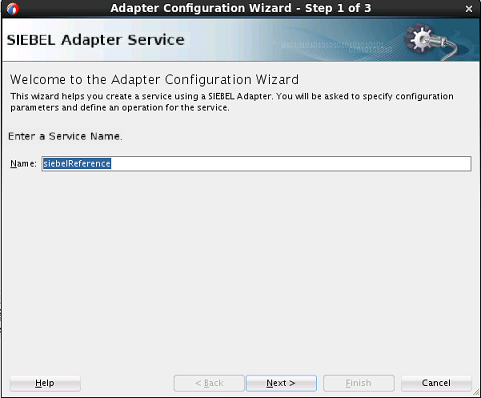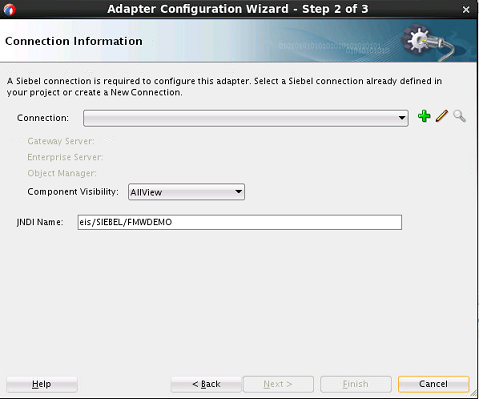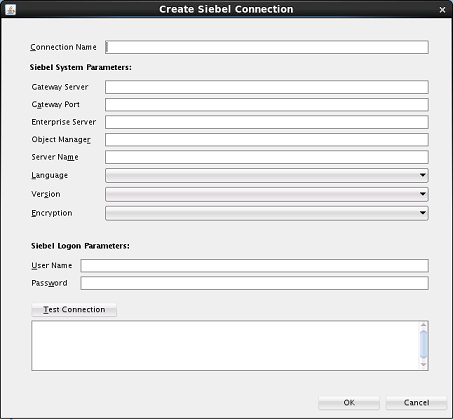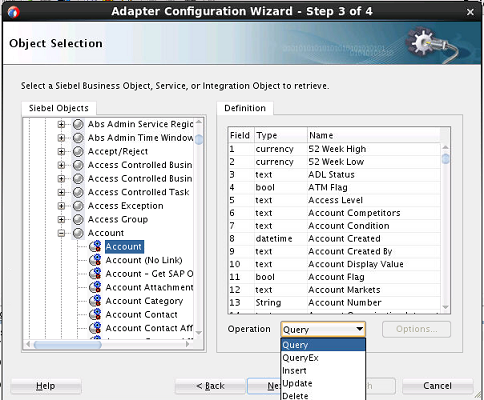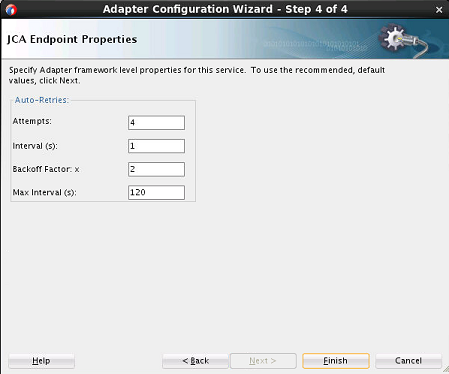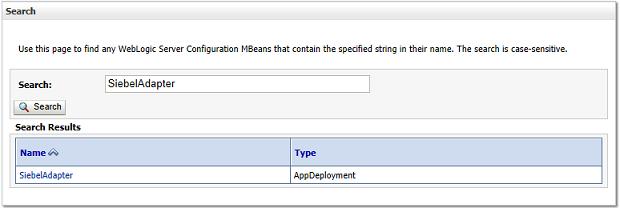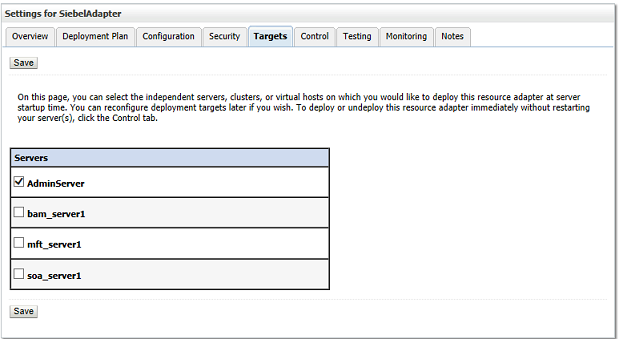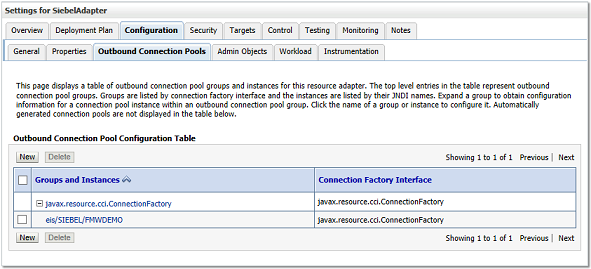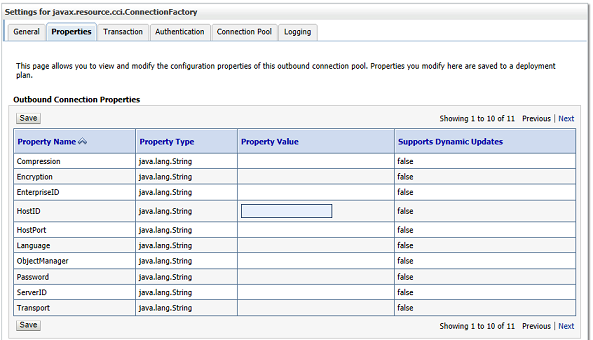16 Oracle JCA Adapter for Siebel
Get an overview of concepts and features of Oracle JCA Adapter for Siebel and learn how to configure it.
Introduction to Oracle JCA Adapter for Siebel
Oracle JCA Adapter for Siebel offers the most complete connectivity solution for Siebel. It delivers unique features to minimize the implementation effort and maximize the effectiveness of the solution.
The Oracle JCA Adapter for Siebel provides comprehensive, standards-based, real-time connectivity to Siebel application systems. The Adapter supports both JCA and Web Service standards for creation of open and reusable service-oriented applications (SOA). The Adapter provides an easy-to-use, robust, scalable connectivity platform to non-intrusively access and expose the critical business logic and data contained with Siebel for building an integrated enterprise.
Oracle JCA Adapter for Siebel includes the following two components.
-
A JDeveloper extension plug-in for the SOA suite composite application designer.
The plug-in allows developers to access the Siebel system, browse Business Objects, Business Components, Business Services and Integration Objects, and generate SCA artifacts such as XSD, WSDL for the associated object and JCA properties for run-time use.
-
A SOA suite run-time environment.
The adapter allows a deployed SOA composite to exchange real-time business data with Siebel systems. It supports synchronous and asynchronous, bidirectional message interactions for Siebel Business Services, Business Components, and Integration Objects. The adapter also supports HTTP transport protocols.
Oracle JCA Adapter for Siebel Concepts
Understand various concepts of Oracle JCA Adapter for Siebel.
Siebel Business Component: A Siebel object type that defines a logical representation of columns in one or more database tables. A business component collects columns from the business component’s base table, its extension tables, and its joined tables into a single structure. Business components provide a layer of abstraction over tables. Applets in Siebel Business Applications reference business components; they do not directly reference the underlying tables.
Siebel Business Object: A Siebel Business Object is a logical business model in the enterprise using a set of interrelated Business Components.
Siebel Business Service: A Siebel Business Service consists of a set of functionality that can be invoked to perform business functions.
Siebel Integration Object: A Siebel Integration object represents integration metadata for Siebel business objects, XML, and other external data structures.
Siebel Integration Component: A constituent part of a Siebel integration object that represents a Siebel business component.
Siebel Integration Component Field: A data structure that contains one data element in a Siebel integration component. Represents a Siebel business component field.
Oracle JCA Adapter for Siebel Features
Get an overview of the various features of Oracle JCA Adapter for Siebel.
These capabilities of Oracle JCA Adapter for Siebel are available out of the box with no additional software requirements.
Comprehensive Siebel Connectivity
The Oracle JCA Adapter for Siebel provides connectivity to Siebel. It uses the Siebel COM and Java Data Bean API to synchronously invoke Siebel transactions - Siebel Business Objects and Business Services.
Simple and Easy to use Design Time Graphical Interface
The design-time tool of Oracle JCA Adapter for Siebel enables dynamic browsing of the various Siebel Business Objects, Business Services and Integration Objects by interfacing with the Siebel Business Layer without any coding effort. The design-time tool exposes the Adapter Services as a Web Service in few simple clicks and enables rapid implementation. Since this introspection is dynamic, all custom written or extended Siebel interfaces and objects are available for use.
Standards Support
The Oracle JCA Adapter for Siebel is based on open standards and exposes the underlying Siebel functionality as JCA and Web Services. The Oracle Fusion Middleware product components are seamlessly and rapidly integrated with the Siebel system through these standard interfaces.
Complete Management through the Oracle Application Server
The Oracle JCA Adapter for Siebel is deployed on top of Oracle Application Server and leverages it for scalability and high availability. The Oracle Application Server enables the user to monitor and manage the adapter Life-cycle.
Siebel Exceptions Handling
Oracle JCA Adapter for Siebel exceptions are either Retry-able exceptions or non-Retry-able exceptions. Remote exceptions (or remote exception) are usually retry-able exceptions. The Oracle JCA Adapter for Siebel throws these types of exceptions based on the error from an outbound invocation to the Siebel system. The JCA framework catches the remote exception and initiate a retry action. Business exceptions (or binding exceptions) are non-retry-able exceptions. The message enters a recovery queue and the calling service engine performs the recovery work.
Design-time and Runtime Functionality of the Oracle JCA Adapter for Siebel
Understand the design-time and runtime functionality of the Oracle JCA Adapter for Siebel.
Design-time Features
-
connect to the Siebel system through the Siebel Adapter Wizard.
-
browse Siebel Business Objects, Siebel Business Services, and Siebel Integration Objects.
-
invoke and test Siebel objects.
-
generate artifacts (XSD, WSDL and JCA properties) for Siebel Business Objects, Siebel Business Services, and Siebel Integration Objects.
-
configure options for runtime to obtain XML-based events from Siebel.
Runtime Interaction Features
-
connect with Siebel EAI Object Manager using the Siebel specific information.
-
operate from SOA to Siebel with Siebel Business Components and Siebel Business Services
The adapter also supports:-
asynchronous operation from SOA to Siebel with Siebel Integration Objects.
-
message delivery on the outbound operation.
-
exception handling and management.
-
the adapter diagnostic framework for adapter diagnosability reports and alerts.
-
Configuring Oracle JCA Adapter for Siebel
Understand the various configuration parameter that are required for configuring Oracle JCA Adapter for Siebel and learn how to configure.
Oracle JCA Adapter for Siebel Configuration Wizard Connection Parameters
To configure the Oracle JCA Adapter for Siebel, provide the connection information through the Connection Screen of the Siebel Adapter Configuration Wizard. Refer to the following table for information about the parameters to use to connect the Oracle JCA Adapter for Siebel to a Siebel Server.
Table 16-1 Oracle JCA Adapter for Siebel Configuration Wizard Connection Parameters
| Parameter | Definition | Required / Optional |
|---|---|---|
|
Gateway Server |
Siebel gateway server IP address |
Required |
|
Gateway Port |
Siebel gateway server port |
Required |
|
Enterprise Server |
Siebel enterprise server name |
Required |
|
Object Manager |
For Siebel 7.0.3, the default Object Manager is EAIObjMgr. For Siebel 7.7, the default is EAIObjMgr_enu. Siebel 7.7 requires a language extension (for example, _enu) to be added to the end of the Object Manager name. |
Required |
|
Server Name |
Siebel server host name |
Optional |
|
Language |
Language key, default value is English, which is represented as enu. Depending on Siebel system versions, different languages might be supported. |
Required |
|
Version |
The JDB versions vary per Siebel Version Siebel 7.7 and above (default) |
Required |
|
Encryption |
The encryption values decide whether a connection to the Siebel system should be encrypted. Values are either:
|
Optional |
|
User Name |
Required |
|
|
Password |
Masked |
Required |
Oracle JCA Adapter for Siebel Configuration Wizard Flow
This section contains the steps for configuring Oracle JCA Adapter for Siebel
The Siebel Adapter wizard:
-
defines the required JCA properties.
-
updates SCA artifacts representing the Siebel endpoint including:
-
a JCA property file.
-
XSD and WSDL files from selected object.
-
-
updates the SCA composite artifacts to reflect the change.
Deploying with JDeveloper
You must deploy the application profile for the SOA project and the application you created in the preceding steps. To deploy the application profile using JDeveloper, perform the following steps:
- Create an application server connection. For more information, see Creating an Application Server Connection for Oracle JCA Adapters.
- Deploy the application. For more information, see Deploying Oracle JCA Adapter Applications from JDeveloper.
Activating Oracle JCA Adapter for Siebel
The Oracle JCA Adapter for Siebel is an optional adapter, thus its initial state is Installed under deployment summery, not Active. You must make the Oracle JCA Adapter for Siebel state active.
Configuring Connection Pooling for Oracle JCA Adapter for Siebel
A JCA connector must provide pooling support. This section describes the process for creating connection pooling for Oracle JCA Adapter for Siebel.
Oracle JCA Adapter for Siebel Artifacts
When a Oracle JCA Adapter for Siebel is configured, the following artifacts are created.
Business Component XSD
XSD is generated for Business Component methods. For example, here is the request/response schema for the Account Business Component.
The following is an example of Request Schema for Business Component.
<xsd:schema xmlns:xsd=http://www.w3.org/2001/XMLSchema …>
<xsd:element name="SiebelRequest">
<xsd:complexType>
<xsd:sequence>
<xsd:element name="insert" type="ns1:record" />
</xsd:sequence>
</xsd:complexType>
</xsd:element>
<xsd:complexType name="record">
<xsd:sequence>
<xsd:element name="_nb52_0x20_Week_0x20_High" type="xsd:string"
minOccurs="0" />
<xsd:element name="_nb52_0x20_Week_0x20_Low" type="xsd:string"
minOccurs="0" />
<xsd:element name="ADL_0x20_Status" type="xsd:string"
minOccurs="0" />
<xsd:element name="ATM_0x20_Flag" type="xsd:string"
minOccurs="0" />
<xsd:element name="Access_0x20_Level" type="xsd:string"
minOccurs="0" />
<xsd:element name="Account_0x20_Competitors" type="xsd:string"
minOccurs="0" />
<xsd:element name="Account_0x20_Condition" type="xsd:string"
minOccurs="0" />
</xsd:sequence>
</xsd:complexType>
</xsd:schema>The following is an example of Response Schema for Business Component.
<xsd:schema …>
<xsd:element name="SiebelResponse">
<xsd:complexType>
<xsd:attribute name="ROW_ID" type="xsd:string" use="required" />
</xsd:complexType>
</xsd:element>
</xsd:schema>
WSDL
WSDL is generated on the Business Component methods. The WSDL operation name is the action name. For example, the following WSDL is generated for insert method of the Account/Account.
The following is an example of Insert Method Siebel Adapter WSDL Artifact
<definitions …>
<types>
<!—import the request and response schema
</types>
<message name="response">
<part element=”ns1:SiebelResponse" name="output_insert"/>
</message>
<message name="request">
<part element=" ns1:Siebel" name="input_insert"/>
</message>
<portType name="insertPortType">
<operation name="insert">
<input message="ns2:request" name="Input_insert"/>
<output message="ns2:response" name="Output_insert"/>
</operation>
</portType>
<plt:partnerLinkType name="insertPartnerLinkType">
<plt:role name="insertRole">
<plt:portType name="ns2:insertPortType"/>
</plt:role>
</plt:partnerLinkType>
</definitions>
JCA
JCA properties are generated for the Siebel integration endpoint. It includes the connection-factory, endpoint-interaction, interaction-spec, property for interaction-spec and so on.
The following is an example of JCA property File
<connection-factory location="eis/MySiebel"/>
<endpoint-interaction portType="Internal_0x20_Contact_0x20_Interface_PT">
<interaction-spec className="oracle.tip.adapter.siebel.SeblBCInteractionSpecImpl">
<property name="BusinessObjectName" value="Contact"/>
<property name="BusinessComponentName" value="Account"/>
<property name="Action" value="insert"/>
<property name="ExecutionTimeout" value="50000000"/>
</interaction-spec>
</endpoint-interaction>Business Service XSD
The request schema represents the input parameters of a Business Service method. For example, the following request schema represents the CreateAccount method of the Account Business Service.
The following is an example of Request Schema Business Service XSD for CreateAccount Method.
<xsd:schema …>
<xsd:element name="AdapterParams">
<xsd:complexType>
<xsd:sequence>
<xsd:element name="Account_0x20_IO" type="xsd:string"/>
</xsd:sequence>
</xsd:complexType>
</xsd:element>
</xsd:schema>The response schema represents the output parameters of a Business Service. However, the response schema does not include the error message and success flag. The error message is wrapped in an exception.
The following is an example of Request Schema Business Service XSD for CreateAccount Method.
<xsd:schema …>
<xsd:element name="Response">
<xsd:complexType>
<xsd:sequence>
<xsd:element name="Account_0x20_Id" type="xsd:string"/>
</xsd:sequence>
</xsd:complexType>
</xsd:element>
</xsd:schema>Business Service WSDL
WSDL is generated for the Business Service method. The WSDL operation name is the method name. The following example shows the Business Service WSDL of the CreateAccount Method.
The following is an example of Business Service CreateAccount Method WSDL.
<definitions …>
<types>
<!—import the request and response schema
</types>
<message name="request">
<part element="ns1:AdapterParams" name="input_CreateAccount"/>
</message>
<message name="response">
<part element="ns1:Response" name="output_CreateAccount"/>
</message>
<portType name="CreateAccountPortType">
<operation name="CreateAccount">
<input message="ns2:request" name="Input_CreateAccount"/>
<output message="ns2:response" name="Output_CreateAccount"/>
</operation>
</portType>
<plt:partnerLinkType name="CreateAccountPartnerLinkType">
<plt:role name="CreateAccountRole">
<plt:portType name="ns2:CreateAccountPortType"/>
</plt:role>
</plt:partnerLinkType>
</definitions>JCA Property for Business Service
JCA properties are generated for the Siebel integration endpoint. It must include the connection-factory, endpoint-interaction, interaction-spec, property for interaction-spec, and so on. The adapter generates the JCA property file for the Business Service. An example file follows.
The following is an example of JCA File for Business Service CreateAccount Method.
<connection-factory location="eis/MySiebel"/>
<endpoint-interaction portType="Account_0x20_PT">
<interaction-spec className="oracle.tip.adapter.siebel.SeblBSInteractionSpecImpl">
<property name="BusinessServiceName" value="Account"/>
<property name="MethodName" value="CreateAccount"/>
<property name="ExecutionTimeout" value="50000000"/>
</interaction-spec>
</endpoint-interaction>